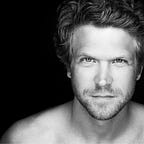We Are the Luckiest book review
I enjoyed Laura McKowen’s We Are the Luckiest for the same reason I enjoy books — they express something no other medium can. There are degrees that separate any form of communication, sure. You can say in a phone call what you can’t thumb in a text. You watch live theater for the human element and go to the movie theater for the aesthetic element. I even think there is a qualifiable difference in the experience of reading a book in print and reading it on a screen or listening to it on a device.
This book, in my opinion, is one you want to hold in your hand. There is something about giving books space in our lives that changes how we approach the words written in them. Print books are portals to a different world. Screens don’t have the same launching capability because we do everything else on them — shop, swipe, scroll. In this way, screens reflect. Books carve.
And what I’m trying to get at is that We Are the Luckiest is exactly the sort of book you want to give space to. It is a departure from the world you are comfortable with. Like some other good non-fiction and poetry I flip open again and again, these essays are transportive.
A lot of writers can describe the experience of being in their head. I’m reading a sterling example of that now in Persig’s Zen and the Art of Motorcycle Maintenance. I am getting a glimpse into his thought process. And his thought process gives me a glimpse into our modern era’s existential malaise. But the power of reading Zen and the Art generates the power of the author’s internal thoughts imposing on the exterior world. Most good non-fiction achieves this. Good fiction does too. Stories can change how we see things. They imbue our perspective with different sentimentalities. This is important. It’s what I most often tell my students is the point of studying literature: to develop the ability to see and feel things outside of yourself. We Are the Luckiest dazzles because it achieves that shift in perspective, only McKowen’s focus is inward, not outward. McKowen not only challenges the reader to take on a new view of himself, but provides that reader the lens to accomplish it.
She invites the reader to join in the universal suffering that is, most irreplaceably, being human. Her tag line of being a “human being, being human” is one that I’ve already took on the road, into my classroom and community. It is a saying backed by a worldview that I will use for my lifetime, I imagine. A few other highlights follow.
She dismantles cliches with the tools of experience. Those glib sayings shine again as a result. She articulates phenomena in her moments of clarity that allow you to experience what she already has. She humbles herself in the ways we should all seek humility: to build back up in us what is true and genuine. She shreds the distance between alcoholics and normies in humorous and compassionate ways. Her tapestry threads pain with promise, blemish with beauty. The dark waters of shame are warmer than you think.
I could go on, but the point of this review is to explain what makes McKowen’s book different. This read is unique because she accomplishes those tasks in her writing of the book. The action of it. The brunt force of reading it is not in the reading of it, but in her writing it. This is not some treatise on spirituality; it is an experience of something startlingly intimate, something shared. The unique effect of literature like this does not change the way the reader sees the world; it changes the way the reader sees himself.
This is an impact only books can bring. I mean sure, certain experimental theater or some Yargos Lanthimos film can force us to think about ourselves in ways we’ve never imagined. But in those the audience is usually encouraged to see our darker parts to prove that everybody has them. McKowen has a different intention. She wants each reader to love themselves the way she has learned to love herself. These essays peak when McKowen shows the reader how she did just that.
I shouldn’t be all that surprised. I’ve written blog posts for years that expound on the central idea of We Are the Luckiest. It is what I call the Miracle of the Mundane. If we clear away what isn’t, we can see what is. And what is is beautiful. Naturally, I am a target audience for this book: I am a sober person who writes about recovery. But what I’d like any reader of this review to know about the book is that it is for you, not because you are in recovery, but because you are a human being, being human.
